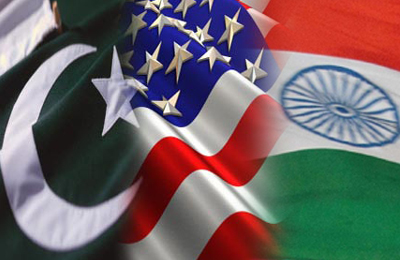US-Pakistani ‘Reset’ Doomed as Chasm Widens Over Terror, India
 Michael Hughes
Michael Hughes
December 2, 2017
Recent efforts to jumpstart a dialogue between the U.S. and Pakistan seem futile given the duo’s irreconcilable differences – especially in two key areas. The U.S. wants Pakistan to hand over the Haqqani Network and other Afghan Taliban while Islamabad would like Washington to dial down its love affair with India. However, it is hard to imagine either side budging with the U.S.-Pakistani trust gap growing larger by the day.
On Friday, the Pentagon said in a press release that U.S. Defense Secretary James Mattis is planning to visit Pakistan on December 4 to meet with Prime Minister Shahid Khaqan Abbas and Chief of Army Staff General Qamar Bajwa. Foreign Office spokesperson Mohammed Faisal said that the visit marks a continuation of an “ongoing” dialogue to build trust.
“We are trying to find common grounds and move forward in our bilateral relationship with the U.S. in a positive and cooperative manner,” Faisal said at a press briefing on November 30.
However, Mattis’ trip – supposedly a harbinger of good hope – was announced just days after the top U.S. commander in Afghanistan, General John Nicholson, excoriated Pakistan for allowing the Afghan Taliban to live “in comfort.”
While Pakistani forces have acted on some extremist groups, Nicholson said, they have failed to root out Afghan Taliban members, many of whom have been living in safe havens in Pakistan since the movement was ousted from Afghanistan in 2001. The general also said his Pakistani counterparts know precisely where these are located.
“The offensive operations against sanctuaries would be in other areas that we’ve identified with the Pakistani leadership on a number of occasions,” Nicholson told reporters in a video conference on November 28.
This brute fact among others are part of a list of non-starters that preclude any meaningful negotiations, as Imtiaz Gul, the Executive Director of the Center for Research and Security Studies, recently argued.
“Strategic fault lines in U.S.-Pakistan relations have never been more pronounced, nor have Washington’s geo-strategic intentions for Pakistan ever been made more explicit,” Gul wrote in a piece for the East Asia Forum on December 1. “This is a function of non-negotiable constants that underpin each nation’s attitude to the other that are unlikely to change soon.”
Gul also made clear that there are some legitimate security reasons as to why Islamabad is unlikely to meet American demands to crack down on the “Good Taliban.”
“Islamabad fears that doing so might encourage a greater alliance between all shades of Pakistani and Afghan Taliban and ignite a new war inside Pakistan,” Gul claimed.
Exacerbating the issue is the political situation inside Pakistan, which some fear is making conditions ripe for extremists to become even more dominant.
“The series of events in Pakistan over the past two months that culminated in the siege of its capital Islamabad by adherents of the Tehreek-i-Labaik Ya Rasool Allah (TLYRA) – and the following abject surrender of the state – are an ominous warning of the rise of the religious right in the country,” Tilak Devasher said in India Today on November 30.
The political wing of the TLYRA, Devasher explained, called the Tehrik-i-Labaik Pakistan (TLP) and the JUD/ LeT-linked Milli Muslim League (MML) burst onto Pakistan’s political scene by doing notably well in local elections in September and October. The emergence of these parties, he claimed, might be the army’s effort to “mainstream” militant and jihadi groups.
Broader geopolitical issues play a pivotal role here too, of course, with the U.S. seeing India as a partner in checking China. Meanwhile, Beijing, sensing this, has become an even more stalwart ally of Pakistan. Chinese financial support is among the reasons why Pakistan needs the United States less than Washington may need Islamabad.
The Trump administration has appeared tone deaf to Pakistan’s fears over Indian influence in Afghanistan. During a visit to Kolkata on December 1, Acting Deputy Assistant Secretary for South and Central Asia, Thomas Vajda, said that U.S. relations with India have never been better and gave a not so veiled reference to Pakistan.
“The relations between India and the U.S. stand on their own merit and are not directed towards any one country in the region,” Vajda told reporters.
Secretary of State Rex Tillerson during his visit to Pakistan on October 24 delivered an ominous message suggesting that the Trump administration would adjust its tactics to achieve the objective in a “different way” if Islamabad failed to take decisive action against the Haqqani Network and other terrorist groups on a U.S. wish list.
In this context, Faisal’s expressed hopes of finding common ground and moving forward in a cooperative manner with the United States seem either naïve or simply lip service. Short of some tectonic paradigm shifts on either side of this equation, the obstacles blocking genuine dialogue appear more insurmountable than ever.
